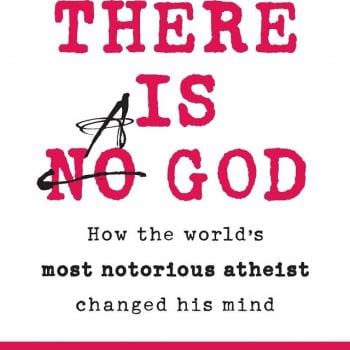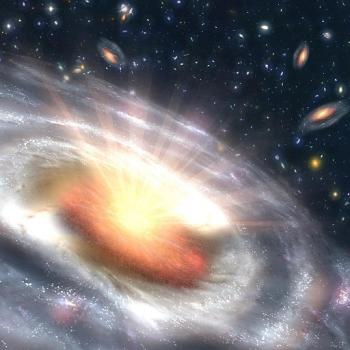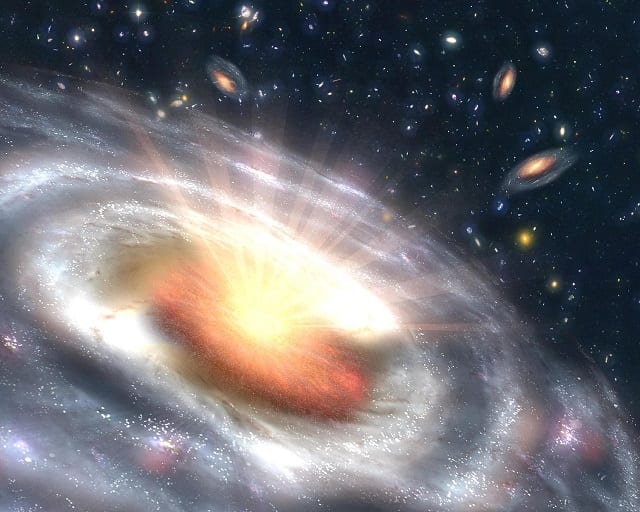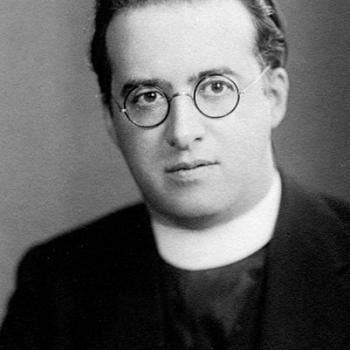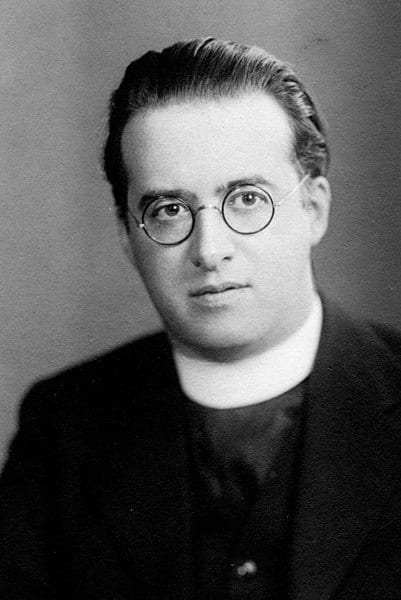Studies in Flew’s Justification of His Change of Mind and the Predictable Reaction of Atheists
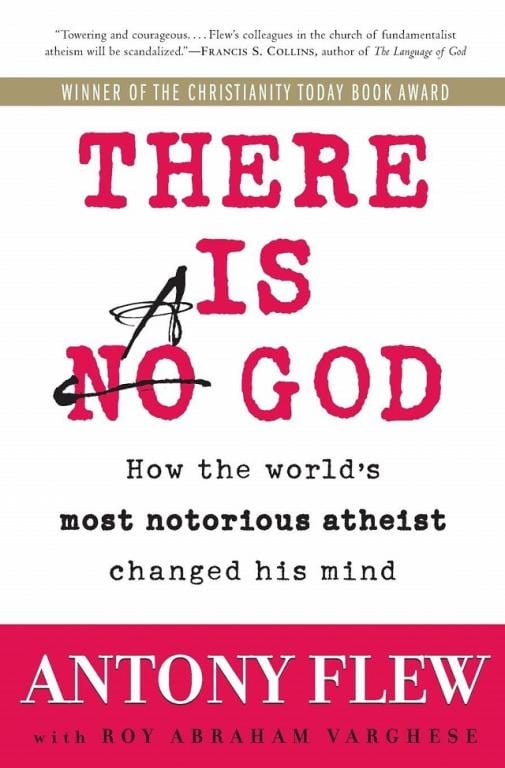
[Antony Flew’s words will be in blue]
***
For a prior overview about Flew’s importance in the world of philosophy and the resurgence of theism in those circles, see Dr. Phillip Blosser’s blog article (filled with links to interesting related materials), Former atheist, Antony Flew, now believes in God. See also his page on infidels.org, which gives several links to older papers.
The flurry of stories on this topic which were prevalent in the media around 9 December 2004, were typified by the following, in the Guardian Unlimited:
Famous Atheist Now Believes in God [link from The Guardian now defunct]Thursday December 9, 2004 10:01 PM
By Richard N. Ostling
AP Religion Writer
NEW YORK (AP) – A British philosophy professor who has been a leading champion of atheism for more than a half-century has changed his mind. He now believes in God – more or less – based on scientific evidence, and says so on a video released Thursday.
At age 81, after decades of insisting belief is a mistake, Antony Flew has concluded that some sort of intelligence or first cause must have created the universe. A super-intelligence is the only good explanation for the origin of life and the complexity of nature, Flew said in a telephone interview from England.
Flew said he’s best labeled a deist like Thomas Jefferson, whose God was not actively involved in people’s lives.
“I’m thinking of a God very different from the God of the Christian and far and away from the God of Islam, because both are depicted as omnipotent Oriental despots, cosmic Saddam Husseins,” he said. “It could be a person in the sense of a being that has intelligence and a purpose, I suppose.”
Flew first made his mark with the 1950 article “Theology and Falsification,” based on a paper for the Socratic Club, a weekly Oxford religious forum led by writer and Christian thinker C.S. Lewis.
. . . biologists’ investigation of DNA “has shown, by the almost unbelievable complexity of the arrangements which are needed to produce (life), that intelligence must have been involved,” Flew says in the new video, “Has Science Discovered God?” . . .
The first hint of Flew’s turn was a letter to the August-September issue of Britain’s Philosophy Now magazine . . .
[Here is what he wrote, in his now-online letter: “Probably Darwin himself believed that life was miraculously breathed into that primordial form of not always consistently reproducing life by God, though not the revealed God of then contemporary Christianity, who had predestined so many of Darwin’s friends and family to an eternity of extreme torture.“But the evidential situation of natural (as opposed to revealed) theology has been transformed in the more than fifty years since Watson and Crick won the Nobel Prize for their discovery of the double helix structure of DNA. It has become inordinately difficult even to begin to think about constructing a naturalistic theory of the evolution of that first reproducing organism.”]
. . . if his belief upsets people, well “that’s too bad,’‘ Flew said. “My whole life has been guided by the principle of Plato’s Socrates: Follow the evidence, wherever it leads.”. . . Flew told The Associated Press his current ideas have some similarity with American “intelligent design” theorists, who see evidence for a guiding force in the construction of the universe. He accepts Darwinian evolution but doubts it can explain the ultimate origins of life.
The Sunday Times of Britain (12-12-04) took a similar view, in its article, Sorry, says atheist-in-chief, I do believe in God after all, by Stuart Wavell and Will Iredale:
One of the most renowned atheists of the past half century has changed his mind and decided that there is a God after all . . . Flew, the son of a Methodist minister, is keen to repent. “As people have certainly been influenced by me, I want to try and correct the enormous damage I may have done,” he said yesterday.But he is unlikely to proclaim his faith from a pulpit. He is still not a Christian and dismisses the conventional forms of divinity as “the monstrous oriental despots of the religions of Christianity and Islam”. He also stands by his rejection of an afterlife.
. . . Darwin’s theory of evolution does not explain the origin and development of life to Flew’s satisfaction. “I have been persuaded that it is simply out of the question that the first living matter evolved out of dead matter and then developed into an extraordinarily complicated creature,” he said.
Flew finds the conventional explanation that life arose out of a complex chemical brew or primordial soup “improbable”. So he is emulating Socrates and “following the argument wherever it leads. The conclusion is — there must have been some intelligence”.
His volte face is all the more remarkable given his vehement denial of internet rumours in 2001 that he had renounced his atheism. His response was entitled: “Sorry To Disappoint, but I’m Still an Atheist!”
The latter article (8-31-01), however, reproduced on The Secular Web, contains fascinating tidbits that go far beyond the usual atheist party line. For Flew wrote:
[I]t can be entirely rational for believers and negative atheists to respond in quite different ways to the same scientific developments.We negative atheists are bound to see the Big Bang cosmology as requiring a physical explanation; and that one which, in the nature of the case, may nevertheless be forever inaccessible to human beings. But believers may, equally reasonably, welcome the Big Bang cosmology as tending to confirm their prior belief that “in the beginning” the Universe was created by God.
Again, negative atheists meeting the argument that the fundamental constants of physics would seem to have been ‘fine tuned’ to make the emergence of mankind possible will first object to the application of either the frequency or the propensity theory of probability ‘outside’ the Universe, and then go on to ask why omnipotence should have been satisfied to produce a Universe in which the origin and rise of the human race was merely possible rather than absolutely inevitable. But believers are equally bound and, on their opposite assumptions, equally justified in seeing the Fine Tuning Argument as providing impressive confirmation of a fundamental belief shared by all the three great systems of revealed theistic religion – Judaism, Christianity, and Islam.
. . . In short, I recognize that developments in physics coming on the last twenty or thirty years can reasonably be seen as in some degree confirmatory of a previously faith-based belief in god, even though they still provide no sufficient reason for unbelievers to change their minds. They certainly have not persuaded me.
I’ve been contending for years that theism is at least as reasonable a position as atheism, particularly in the context of attempts to interpret Big Bang cosmology. It is very nice to observe one of the world’s leading atheists “concede” or agree with this (when he was still a card-carrying atheist). Many atheists have no toleration whatever for the eminently reasonable (and, I think, rather obvious) position which holds that theists (not Christians: one subset of the larger group, involving many more tenets and presuppositions) are at least as reasonable and epistemically justified as atheists — wholly apart from the opposite conclusions that each party arrives at.
For them, Christians and even theistic philosophers must be seen as simpletons and ignoramuses (or reasonable facsimile thereof), caught in a medieval belief-system and hopelessly behind the times. Not so, said Flew, over three years ago.
The best source at present to learn about Flew’s newly-adopted opinion (from his own words), seems to be an interview by evangelical Protestant philosopher Gary R. Habermas; subsequently published in the Winter 2004 issue of Philosophia Christi: the journal of the Evangelical Philosophical Society, considered one of the best journals of philosophy of religion in the world. The article notes that Habermas “has debated Flew several times.
They have maintained a friendship despite their years of disagreement on the existence of God . . . Over the next twenty years, Flew and Habermas developed a friendship, writing dozens of letters, talking often . . .” Furthermore, the introduction states that the interview “took place in early 2004 and was subsequently modified by both participants throughout the year.” Habermas’ words will be in green; Flew’s still in blue:
. . . I don’t believe in the God of any revelatory system, although I am open to that. But it seems to me that the case for an Aristotelian God who has the characteristics of power and also intelligence, is now much stronger than it ever was before.Once you mentioned to me that your view might be called Deism. Do you think that would be a fair designation?
Yes, absolutely right. What Deists, such as the Mr. Jefferson who drafted the American Declaration of Independence, believed was that, while reason, mainly in the form of arguments to design, assures us that there is a God, there is no room either for any supernatural revelation of that God or for any transactions between that God and individual human beings.
Then, would you comment on your “openness” to the notion of theistic revelation?
Yes. I am open to it, but not enthusiastic about potential revelation from God. On the positive side, for example, I am very much impressed with physicist Gerald Schroeder’s comments on Genesis 1. That this biblical account might be scientifically accurate raises the possibility that it is revelation.
. . . [you commented] that naturalistic efforts have never succeeded in producing “a plausible conjecture as to how any of these complex molecules might have evolved from simple entities.” . . . You mention a number of trends in theistic argumentation that you find convincing, like big bang cosmology, fine tuning and Intelligent Design arguments. Which arguments for God’s existence did you find most persuasive?
I think that the most impressive arguments for God’s existence are those that are supported by recent scientific discoveries. I’ve never been much impressed by the kalam cosmological argument, and I don’t think it has gotten any stronger recently. However, I think the argument to Intelligent Design is enormously stronger than it was when I first met it.
So you like arguments such as those that proceed from big bang cosmology and fine tuning arguments?
Yes.
. . . when I was in college, I attended fairly regularly the weekly meetings of C. S. Lewis’s Socratic Club. In all my time at Oxford these meetings were chaired by Lewis. I think he was by far the most powerful of Christian apologists for the sixty or more years following his founding of that club.
Although you disagreed with him, did you find him to be a very reasonable sort of fellow?
Oh yes, very much so, an eminently reasonable man.
. . . So of the major theistic arguments, such as the cosmological, teleological, moral, and ontological, the only really impressive ones that you take to be decisive are the scientific forms of teleology?
Absolutely. It seems to me that Richard Dawkins constantly overlooks the fact that Darwin himself, in the fourteenth chapter of The Origin of Species, pointed out that his whole argument began with a being which already possessed reproductive powers. This is the creature the evolution of which a truly comprehensive theory of evolution must give some account. Darwin himself was well aware that he had not produced such an account. It now seems to me that the findings of more than fifty years of DNA research have provided materials for a new and enormously powerful argument to design.
. . . If God is the First Cause, what about omniscience, or omnipotence?
Well, the First Cause, if there was a First Cause, has very clearly produced everything that is going on. I suppose that does imply creation “in the beginning.”
. . . In your view, then, God hasn’t done anything about evil.
No, not at all, other than producing a lot of it.
. . . I still hope and believe there’s no possibility of an afterlife.
. . . you have also written to me that these near death experiences “certainly constitute impressive evidence for the possibility of the occurrence of human consciousness independent of any occurrences in the human brain.”. . . Elsewhere, you again very kindly noted my influence on your thinking here, regarding these data being decent evidence for human consciousness independent of “electrical activity in the brain.” If some near death experiences are evidenced, independently confirmed experiences during a near death state, even in persons whose heart or brain may not be functioning, isn’t that is quite impressive evidence? Are near death experiences, then, the best evidence for an afterlife?
Oh, yes, certainly. They are basically the only evidence.
. . . So you think that, for a miracle, the evidence for Jesus’ resurrection is better than other miracle claims?
Oh yes, I think so. It’s much better, for example, than that for most if not of the, so to speak, run of the mill Roman Catholic miracles.
. . . You have made numerous comments over the years that Christians are justified in their beliefs such as Jesus’ resurrection or other major tenants of their faith. In our last two dialogues I think you even remarked that for someone who is already a Christian there are many good reasons to believe Jesus’ resurrection. Would you comment on that?
Yes, certainly. This is an important matter about rationality which I have fairly recently come to appreciate. What it is rational for any individual to believe about some matter which is fresh to that individual’s consideration depends on what he or she rationally believed before they were confronted with this fresh situation. For suppose they rationally believed in the existence of a God of any revelation, then it would be entirely reasonable for them to see the fine tuning argument as providing substantial confirmation of their belief in the existence of that God.
. . . What do you think that Bertrand Russell, J. L. Mackie, and A. J. Ayer would have thought about these theistic developments, had they still been alive today?
I think Russell certainly would have had to notice these things. I’m sure Mackie would have been interested, too. I never knew Ayer very well, beyond meeting him once or twice.
Do you think any of them would have been impressed in the direction of theism? I’m thinking here, for instance, about Russell’s famous comments that God hasn’t produced sufficient evidence of his existence.
Consistent with Russell’s comments that you mention, Russell would have regarded these developments as evidence. I think we can be sure that Russell would have been impressed too, precisely because of his comments to which you refer. This would have produced an interesting second dialogue between him and that distinguished Catholic philosopher, Frederick Copleston.
In recent years you’ve been called the world’s most influential philosophical atheist. Do you think Russell, Mackie, or Ayer would have been bothered or even angered by your conversion to theism? Or do you think that they would have at least understood your reasons for changing your mind?
I’m not sure how much any of them knew about Aristotle. But I am almost certain that they never had in mind the idea of a God who was not the God of any revealed religion. But we can be sure that they would have examined these new scientific arguments.
C. S. Lewis explained in his autobiography that he moved first from atheism to theism and only later from theism to Christianity. Given your great respect for Christianity, do you think that there is any chance that you might in the end move from theism to Christianity?
I think it’s very unlikely, due to the problem of evil. But, if it did happen, I think it would be in some eccentric fit and doubtfully orthodox form: regular religious practice perhaps but without belief.
I ask this last question with a smile, Tony. But just think what would happen if one day you were pleasantly disposed toward Christianity and all of a sudden the resurrection of Jesus looked pretty good to you?
Well, one thing I’ll say in this comparison is that, for goodness sake, Jesus is an enormously attractive charismatic figure, which the Prophet of Islam most emphatically is not.
In his review of Christian Roy Varghese’s book, The Wonder of the World: A Journey from Modern Science to the Mind of God, Flew wrote:
I pointed out, after quoting a significant sentence from the fourteenth and final chapter of The Origin of Species, that one place where, until a satisfactory naturalistic explanation has been developed, there would appear to be room for an Argument to Design is at the first emergence of living from non-living matter. And, unless that first living matter already possessed the capacity to reproduce itself genetically, there will still be room for a second argument to Design until a satisfactory explanation is found for its acquisition of that capacity. You have in your book deployed abundant evidence indicating that it is likely to be a very long time before such naturalistic explanations are developed, if indeed there ever could be.Our disagreements begin with any shift from the God of natural theology to the God of a Revelation.
In a December 2004 phone conversation with humanist Duncan Crary [link defunct], Flew stated:
We must follow the argument wherever it leads. I’ve never thought I knew that there was no God. I merely thought there is no sufficient reason that there is . . . I’m quite happy to believe in an inoffensive inactive god.
The Sunday Times article of 19 December 2004: In the beginning there was something (an interview by Stuart Wavell; link now defunct]) offers more fascinating information:
I’ve never thrown my weight about as an unbeliever. I’ve joined unbelieving organisations but I haven’t attacked belief.. . . My positive belief is in an Aristotelian God. Aristotle never produced a definition, but his God was not interested in human beings. He would have said that if God had really been concerned with human behaviour he would have made us behave according to his own way . . . On the Aristotelian view, the question doesn’t arise about the nature of God.
. . . I don’t want a future life. I want to be dead when I’m dead and that’s an end to it. I don’t want an unending life. I don’t want anything without end.
. . . there’s a world of difference between finding that there’s some very powerful, intelligent being in the background and finding that what you’ve discovered is the God of Abraham, Isaac and Israel.
. . . Darwin saw that there was a problem with the origin of life. It had to begin with a creature capable of producing creatures that are not always identical to their parents. It is simply out of the question that the first living matter evolved out of dead matter and then developed into an extraordinary, complicated creature of which we have no examples. There must have been some intelligence.
. . . I don’t consider the question of God is definitively proved. All Schroeder is saying is that all the chemical complexities that have to be dealt with are such an enormous improbability. This is not a proof but it will do until a proof comes along.
Now that we have a basic understanding of Antony Flew’s thinking, I thought it would be fun and interesting to briefly examine how atheists and agnostics are reacting to it. I am as interested in the psychology and sociology of unbelief as in the philosophy of it. I immediately predicted in my mind when I heard about Flew’s change of opinion, that many in the community of atheists and secularists and skeptics, and so forth, would immediately start to (more or less irrationally and emotionally) minimize and dismiss both his thinking process and he himself.
They would be willing, so I thought (based on my own significant experience in dialogue with them), to cast him to the wind just as quickly as they formerly thought he was an able and worthy representative of their position.
In fact, the entrenched, knee-jerk, almost intellectually reactionary position that many atheists have assumed almost requires this. A search on the Internet tonight quickly confirmed my strong suspicions. In fact, the article just cited reports the hysterical atheist reaction. Wavell writes:
With equal alacrity, the wrath of unbelievers has rebounded on Antony Flew, the philosophy professor responsible for this heresy, leaving him shaken and not very philosophical.
Flew himself complains:
I have been denounced by my fellow unbelievers for stupidity, betrayal, senility and everything you could think of. And none of them have read a word that I have ever written.
Richard Carrier, a frequent contributor to The Secular Web, in his article, Antony Flew Considers God…Sort Of (10-10-04), provides a good insight into atheist / agnostic reaction:
Antony Flew is considering the possibility that there might be a God. Sort of. Flew is one of the most renowned atheists of the 20th century, even making the shortlist of “Contemporary Atheists” at About.com. So if he has changed his mind to any degree, whatever you may think of his reasons, the event itself is certainly newsworthy. After hearing of this, I contacted Antony directly to discuss it, . . . Antony and I exchanged letters on the issue recently, and what I report here about his current views comes from him directly.. . . he is increasingly persuaded that some sort of Deity brought about this universe, though it does not intervene in human affairs, nor does it provide any postmortem salvation. He says he has in mind something like the God of Aristotle, a distant, impersonal “prime mover.” It might not even be conscious, but a mere force. In formal terms, he regards the existence of this minimal God as a hypothesis that, at present, is perhaps the best explanation for why a universe exists that can produce complex life.
. . . Flew’s tentative, mechanistic Deism is not based on any logical proofs, but solely on physical, scientific evidence, or the lack thereof, . . .
. . . Flew took great care to emphasize repeatedly to me that:
My one and only piece of relevant evidence [for an Aristotelian God] is the apparent impossibility of providing a naturalistic theory of the origin from DNA of the first reproducing species … [In fact] the only reason which I have for beginning to think of believing in a First Cause god is the impossibility of providing a naturalistic account of the origin of the first reproducing organisms. [letter of 19 October 2004]
After presenting a fairly accurate picture of Flew’s opinions, Carrier then assumes the usual (almost obligatory) “smarter-than-thou” atheist routine and belittles Flew:
. . . he confesses he has not been able to keep up with the relevant literature in science and theology, which means we should no longer treat him as an expert on this subject . . .. . . there is much to criticize in his rationale even for considering Aristotelian Deism.
Flew has thus abandoned the very standards of inquiry that led the rest of us to atheism. It would seem the only way to God is to jettison responsible scholarship.
This would appear to be his excuse for everything: he won’t investigate the evidence because it’s too hard. Yet he will declare beliefs in the absence of proper inquiry. Theists would do well to drop the example of Flew. Because his willfully sloppy scholarship can only help to make belief look ridiculous.
This comes as no surprise at all, to anyone familiar with the dripping atheist disdain of theism and especially Christianity. Yet, to be fair to Carrier, he does present some late information (less than three weeks’ old, as of this writing) from Flew which shows that he thought some of his earlier rationale for the adoption of deism (while not sufficient to reverse his newfound belief) was flawed:
I now realize that I have made a fool of myself by believing that there were no presentable theories of the development of inanimate matter up to the first living creature capable of reproduction.. . . I have been mistaught by Gerald Schroeder . . . it was precisely because he appeared to be so well qualified as a physicist (which I am not) that I was never inclined to question what he said about physics. (Letter to Richard Carrier, of 29 December 2004)
Carrier has a field day with this information:
Apart from his unreasonable plan of trusting a physicist on the subject of biochemistry (after all, the relevant field is biochemistry, not physics–yet it would seem Flew does not recognize the difference), this attitude seems to pervade Flew’s method of truthseeking, of looking to a single author for authoritative information and never checking their claims (or, as in the case of Dawkins, presumed lack of claims).
But he concedes: “Despite all this, Flew has not retracted his belief in God, as far as I can tell.”
For another subtle, but definite dig at Flew’s reasoning processes, see “Flew’s Flawed Science,” by Victor J. Stenger (Professor of Physics and Astronomy). The unproven and gratuitous atheist assumptions here are legion. But then, what choice does a materialistic scientist have? The universe could only have come about by other physical processes, as matter is all that there is. God and spirit are ruled out beforehand, so the materialist is confined within his own self-created box of epistemological and metaphysical premises and possibilities (and non-possibilities). Flew dared to try to step outside the “orthodox box” of scientific and philosophical materialism, so he is quickly becoming anathema.
One Internet Infidels Discussion Board will provide a representative (I’m quite sure, typical) example of atheist / agnostic spin on former hero Flew (“how the mighty have fallen”).
“JSWilkins” starts in on the ridicule, right on December 9th, when the story was breaking:
. . . his reason is surprisingly weak – he cannot conceive how DNA got going . . . the conclusion is based on an argumentum ad ignoratium. There is no logical conundrum here. It concerns me that Flew does not see this, but then he is only following the standard opinion of hard selectionists like Dawkins. But his argument is an argument from ignorance. He may find it compelling personally, but it is not compelling logically.
Jeff Lawson gives us the patented materialist circular argument:
Well, I have news for Flew: this is not science! I hate to have to espouse the scientific method, so I won’t. Suffice to say, Flew is proffering macro-level conjecture in place of sound theory. In this day and age, rational interpretation of observations must be encoded in productive theories, i.e. theories that are not only entirely consistent with a precise subset of reality but that tell us more than we knew before. Relativity and Quantum Mechanics do this in spades. In comparison, Flew’s ideas are little better than the utterances of the religious: someone who claims to have ‘scientific evidence’ for his creationist ideas but in reality is about as far removed from science as it is possible for an academic to be; I suppose, after all, he’s only a philosopher.
Vinnie provides us with sanctimonious atheist dogmatism:
. . . we have to ask, is Flew a deist or does he subscribe to the absurdity presented by supernatural theism?The last argument raises the issue of an “immaterial being” (in the sense of being non-universal!) interacting with a material world. How is this notion even meaningful?
[i.e., “how could anything possibly be true in any possible world, but materialism? Nothng else can even have meaning, let alone be true”]
E. Garrett (of presumably agnostic persuasion) is one ray of light in this sad spectacle:
Carrier is all too willing to write off one of the brightest minds for our cause. Carrier has devoted his life to studying the origins of life, which those of us who have only spent 50 or so years at should strongly consider. Carrier’s comments of how Flew is forgetful, is petty at best. We all are forgetful and that doesn’t make us any less intelligent.Being that we are capable of higher thinking, let us exercise our brains. Rather than writing off such a smart man, let us spend time studying what he has to say. Read what Flew has read so that we can be a little better informed than the man that would rather insult a great thinker than to do his homework and study for himself.
mike a. is also quite refreshing:
I suggest the secularists force naturalism to either come up with a better story (good luck), or take the lead in opening the door to “other than natural” sources of intelligence (maybe this is the “metaphysical naturalism” your moderator speaks to?)–no “G” word required. The train is going in that direction anyway, as Anthony Flew recognizes. It is possible that, like religious fundamentalists, no amount of evidence will allow secularists to consider forces acting outside the observable space-time framework. Just remember that if that is the case, you don’t have an opinion–you have a dogma.
Then the “true believers” start in again with the condescension. Jehanne opines:
Flew’s “conversion” should not be surprising to those who are true materialists. It just means that “his genes” have finally conquered “his intellect”.
Vinnie concurs with what is now becoming the fashionable spin:
Flew still accepts that “neo-Darwinian evolution” occured to the best of my knowledge as well. I don’t know what the hell he is thinking. I think his genes may have finally caught up….
“macula2020” shows a bit more sophistication and suggests that the whole thing is a plot to sell books, because Flew could not be so stupid as to believe in any sort of God;
I’ll preface my syllogism with the reminder that it represents my opinion only.Although it may at first appear to be an ad hominen attack on Flew, it is not. It is simply a rational hypothesis that illuminates less transparent aspects of Flew’s announcement.
Premise 1. Flew, as an expert in critical thinking and atheistic philosophy, would not commit the fallacy of using a God of the Gaps argument to conclude that God existsPremise 2. Flew, as an expert in critical thinking and atheistic philosophy, would stimulate widespread public attention and interest by announcing his personal belief that God exists
Conclusion: Flew has announced his belief that God exists in order to generate attention and controversy.
Evidence:-Flew or his agent contacted the Associated Press newswire and NBC News via press release with this “story” on or around the same day that his new video, “Has Science Discovered God?” was released.
-every publisher and author knows that controversy sells books; not only has his video just been released, but the new edition of “God and Philosophy” is scheduled for upcoming release.
Administrator DM (former evangelical Christian) feels a need to go after C.S. Lewis, because Flew spoke so highly of him:
Lewis was, in my opinion, both a weak atheist and a weak theist in the sense that he has an extremely poor understanding of correct reasoning (as demonstrated in his book “Mere Christianity,” for example, where he commits one reasoning error after another) . . . Lewis and McDowell–especially–are lightweights when it comes to the quality of their reasoning.
Dominic Milioto brings strict ad hominem to the table:
Flew is a cop-out that’s what. Sounds to me like an old man, confronted by the end of life, making one final desparate attempt at salvation. He has little faith in future generations separating the chaff from the wheat: explaining what now is not.
“tw1tch,” on the other hand, gives us the fair-minded, charitable approach:
Huh…just read Richard Carrier’s updated article on Anthony Flew’s change of viewpoint.I must admit that I am disappointed in the tone of Carrier’s article. Here, in front of God (pardon the expression) and man, the perennial atheist…indeed the foremost thinker of modern atheism…in his twilight years simply changes his mind. Flew has probably done more for atheism, its philosophy and furtherment than any living person. In all probability, he has done more for atheism than infidels.org ever will.
That’s quite a sobering thought. Even more sobering is how, Carrier, in an almost unbelievably comical display…nonchalantly dismisses Flew’s reasoning as ‘willfully sloppy’ and levels charges against Flew of intellectual laziness. Sigh. Intellectually laziness….again, this is a man who has written more books on the subject of athiesm than Mr. Carrier most likely ever will.
Sour grapes are natural fellas. I can’t hold this against you. However, I can’t help but to think that this sheepish (and rightfully so) dismissal of Flews reasoning is more pychological defense mechanism than honest, unbiased assessment.
Perhaps he just changed his mind…no need get ugly about it.
Y.B nevertheless chimes in with more patronizing snobbery:
Erm? Sorry, but I and many others would have been like “Anthony who?” until the ID camp started spinning his “conversion”.
Richard Carrier then sophomorically responds:
Flew’s actual impact on contemporary atheism is virtually nil . . . by his own admission, Flew’s methods have sunk beneath even that of college freshmen.
So what’s the fuss about, since this is a “nobody” we’re dealing with? These guys are quick; you gotta give ’em that . . .
Nothing the least bit surprising here, to those of us who have dealt with the hyper-polemical brand of “Internet atheists.” Many atheists “in real life” (even on the Internet) are fine people, with great integrity (I have atheist friends, and have greatly enjoyed dialogues with several of them), but unfortunately, when they mass together online, the sort of insulting snobbery seen above usually predominates (even, alas, against one from their own camp until about two months ago).
But then, I hasten to add that the same sort of thing occurs in Christian circles, too, so one might say that original sin (along with huge shortcomings in both charity and logic) has been amply proven in the observation of both camps.
Atheist prejudice and condescension is far more likely to usher Flew into Christianity than any arguments by (apologist) folks like myself. You learn all sorts of fascinating things when undergoing a conversion from one thing to another . . .
***
(originally posted on 1-18-05)
Photo credit: photo of Flew’s 2008 book on Amazon.com.
***




